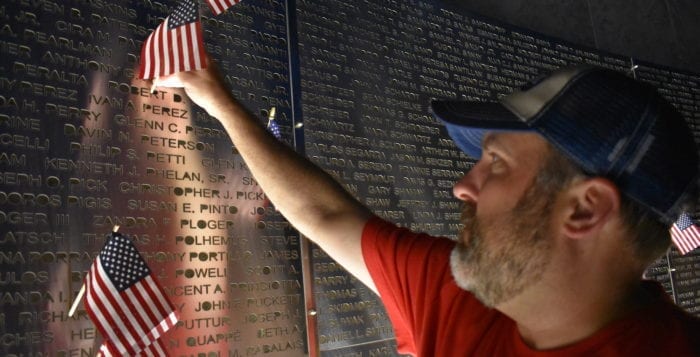D. None of the Above: Remembering when Americans were pulling for, and with, each other

By Daniel Dunaief

September 11th is not just another day.
The country, and the world, stood still for hours, horrified and stunned by the mass murder committed by terrorists in Manhattan, Washington DC and in a field in Western Pennsylvania.
We can focus on the bravery of the first responders that day, on the remarkable effort by the passengers aboard Flight 93 to retake the plane, the loss of 2,977 people, and the passage of time since that horrible day.
We can also consider the incredible generosity and sensitivity of the country in the days, weeks and months afterwards. I know that didn’t apply to everyone and I remember how taxi drivers from mostly Muslim countries put bumper stickers on their cars indicating they were proud Americans. I also recall the unfair and horrific questioning of people who looked different or who might have originally come from Saudi Arabia or any neighboring countries.
Still, in the wake of a day that also lives in infamy, people gave of themselves and their time.
My family, which included our then three-month old daughter and my wife, walked to an upper east side fire station that lost several members when the World Trade Center collapsed.
There, we saw other people in our community who were bringing toys, pies, gifts and money to the department. The members of the fire station, whom we thanked, forced appreciative smiles on their faces and, more often than not, comforted many community members who choked out heartfelt words of thanks to the station’s survivors.
Outside the station, a car from one of those killed that day was barely visible under an enormous collection of flowers.
Prior to 9/11, I had spent considerable time writing about banks and financial services companies. I had a particular and lasting connection with several members of the boutique firm Keefe, Bruyette & Woods.
KBW provided research and investment banking services for a range of banks. In the months after the attack and the loss of lives, banks made sure to include KBW on investment banking deals, trying to help the survivors and the firm stay in business.
On Long Island, a range of companies donated construction materials to create lasting memorials to the people lost on that day, while offering families a place to go to reflect on the people they were fortunate enough to know.
The frenetic city that never sleeps entered a grieving cycle in which people implicitly knew the rules. A collection of cars passing by with their lights on behind a hearse required people always in a hurry to make way.
Despite the need to do things yesterday, to get somewhere faster than everyone else and to beat people’s own records in traveling from one place to another, people stood by, slowed down and made supportive eye contact with those who were putting up pictures of lost loved ones.
As we drove along the roads around New York City, we saw the efficient removal of debris from the World Trade Center site, with twisted metal and concrete sitting on passing flat bed trucks. Cars made room on highways for these huge trucks and turned on their lights in support and sympathy.
In a more insular way, many of us checked on our friends and family, setting aside ongoing familial disagreements.
I remember watching the video of President George W. Bush (41), who had lost the popular vote in 2000 to Al Gore but had won the election on the strength of the final recount in Florida. He was sitting in a classroom when the secret service whispered in his ear about the attacks. He seemed to take a long time to process what he heard.
Yes, people wondered where he went and what was happening with the center of government power and yes, some criticized him even as they flocked to the Churchillian resolve of Mayor Rudy Giuliani, who somehow symbolized the combination of pain and determination in the days after the attack.
People wanted to help each other, donating, volunteering and coalescing around the notion of a country in need of healing and recovery.
Many of the most helpful and supportive moments reflected the strength of a unified nation with a readiness to set aside political squabbles to defend the country. In our darkest moment, we gave flowers, food, support and respect.






